Blasts from the Past! Blu-ray Review: DAIEI: GOTHIC: JAPANESE GHOST STORIES (1959 – 1968)
This “Limited Edition” Blu-ray set from Radiance Films is currently available for purchase.
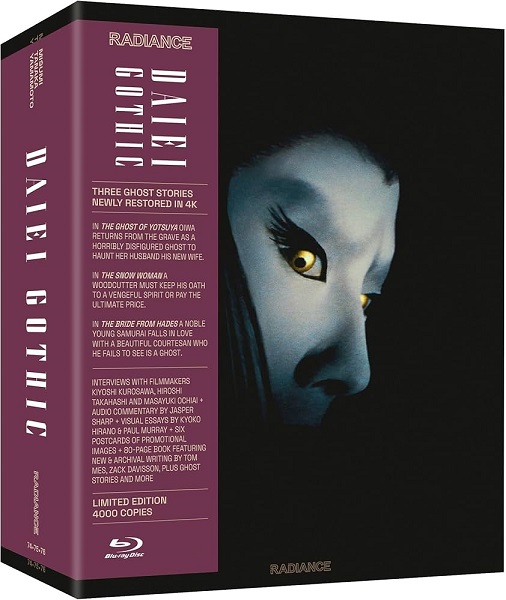
From the beginnings of cinema, there have always been films involving the supernatural. This isn’t just true of North American but international territories as well, including France (Infernal Cauldron), Germany (The Golem, The Cabinet of Dr. Caligari), Sweden (The Phantom Carriage, Haxan) and just about everywhere else. While it took a little bit time for Japan to fully embrace the genre in cinema, citizens certainly heard their share of these kinds of tales through folk stories and theater.
The post-war era is when Japan saw a rise in genre film productions, with many films inspired by folktales about ghosts. While most are familiar with giant monster movies from the era like Godzilla, there were several spookier cinematic treats that didn’t involve these kinds of creatures. Radiance Films has compiled a few notable features that were produced by the Daiei studio. The “Limited Edition” Daiei Gothic: Japanese Ghost Stories Blu-ray set features three notable tales in one collection. As with the distributor’s other releases, you’ll get great restorations of some hard-to-find titles.
The first picture in the set is The Ghost of Yotsuya (1959) an adaptation of a famous story and kabuki theater production. As one critic on the extras state, this particular version is among the creepiest, in part because it alters major story points, resulting in a few surprising developments.
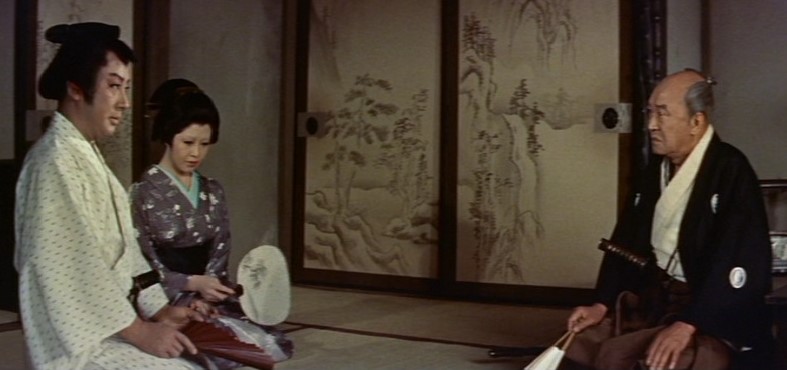
The tale involves a cranky samurai named lemon Tamiya (Shigeru Wakasugi), who has married wife Oiwa (Katsuko Wakasugi) after murdering her father. The lead, who doesn’t have a master anymore, isn’t thrilled about serving anyone else. He believes the entire system to be corrupt, instead spending his time fishing and dealing with friends (who are even crueler than he is). The lead is encouraged to try and find a samurai position elsewhere, but knows that he can’t offer a big enough bribe to earn a spot anywhere. One day, he saves and impresses Oumi (Junko Ikeuchi), the daughter of a potential employer. She wants to marry him and he’s pleased by the idea of joining a higher class, but obviously his marriage poses a big issue.
In the original tale, lemon is completely self-involved and sinister, but in this adaptation everyone around isn’t any better. In fact, several are just as bad if not worse, and lemon doesn’t even directly poison Oiwa and cause her to turn into a vengeful spirit. This version of the lemon character isn’t a good guy, but does appear to feel remorse for the treatment of his wife and isn’t a one-note character, adding a bit more drama to the role.
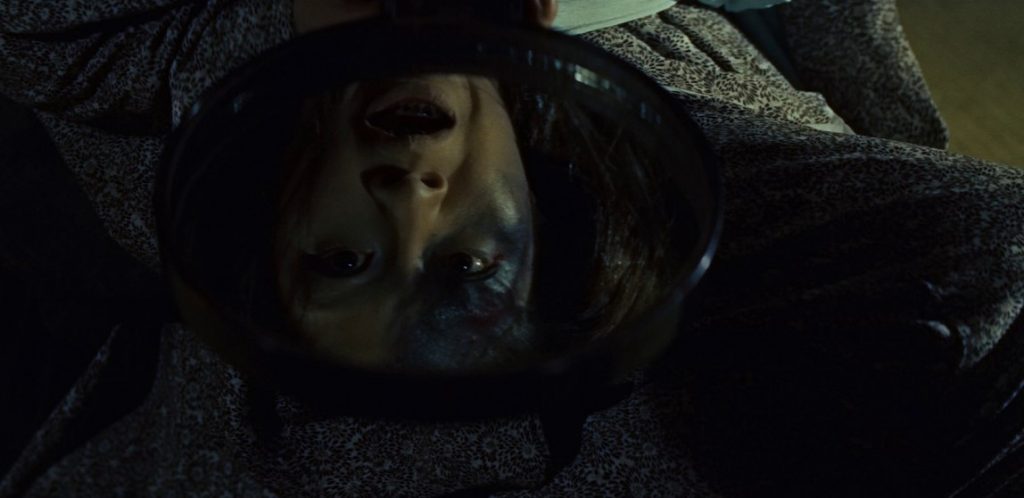
It takes a long time for the poisoning and supernatural transformation to arrive and there is a great deal of melodrama, but when Oiwa returns from the dead, the visuals are striking. This is a nice-looking film from the start, but there are some dazzling visuals once the spirit appears. She glides through sets and combs her dark hair menacingly (this may be the origins of the trend that became commonplace in J-horror films like Ringu). There is also a wonderfully creepy bit towards the climax in a marshy bog.
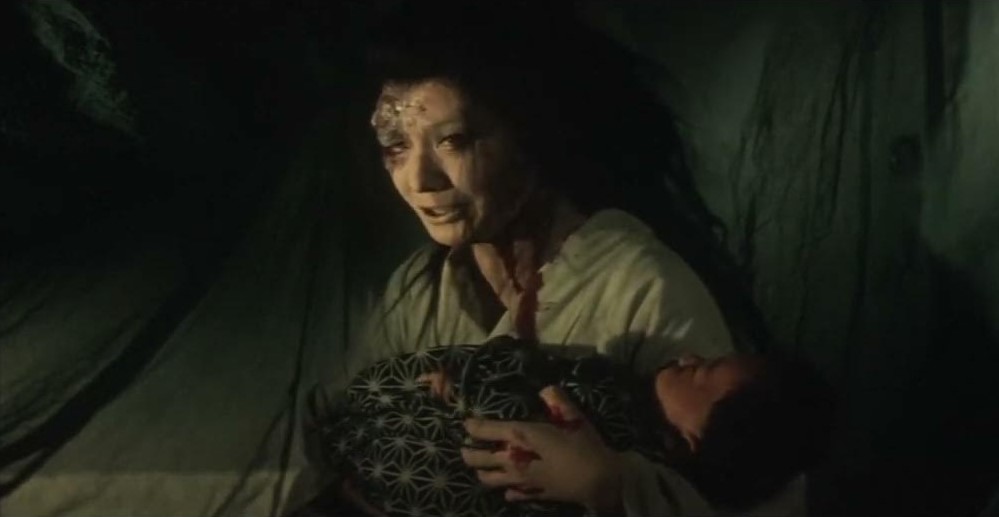
This is an effective ghost story that looks quite nice on disc. The image has been given a 4K restoration. It’s obviously an older title, so there are a few stock shots and effects that aren’t crystal clear, but it generally looks excellent. The disc also comes with a pair of bonuses. There is a conversation with J-horror director Kiyoshi Kurosawa (Cure, Pulse) discussing the story, other iterations of it, and why he likes this telling best of all. He notes the slight changes to the story and lemon, and suggests that Oiwa is a bit more jealous and insecure in this film, helping to make her presence even more intimidating.
The second feature is The Bride from Hades (1959), an entry that incorporates Chinese storytelling elements in its spooky tale. It follows samurai Hagiwara Shinzaburô (Kôjirô Hongô), who has decided to hand up his sword and become a teacher. No one is happy about this and would prefer he marry his brother’s widow, whom he has no interest in. While attending a “lantern festival,” in which locals pay tribute to the souls of loved ones by releasing small, lighted beacons into the water, he helps out the visitors Otsuyu (Miyoko Akaza) and her servant. Hagiwara quickly falls for the woman and begins a relationship with her, but begins to feel drained and grows paler. Friends and family slowly realize that he is in a relationship with a spirit.
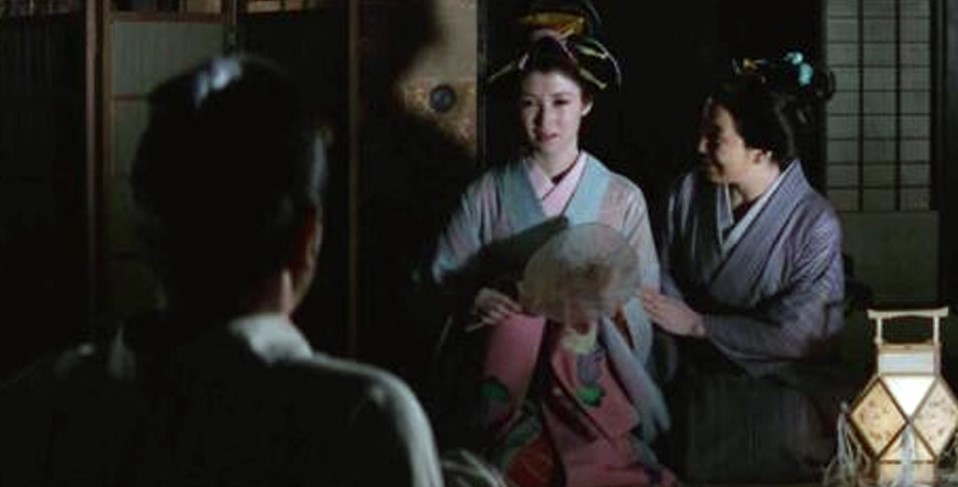
There are interesting elements to the story, including friends who end up trying to profit off of the ghastly situation (who meet a horrible end as a result). And the movie features great wirework. The spirits are often elevated and moving through sets via the technique, resulting in wonderful images. Anytime the ghosts are on display and moving, it’s very exciting to watch. And, as mentioned, there are a few unexpected decisions and material involving supporting characters that keep events from becoming overly predictable.
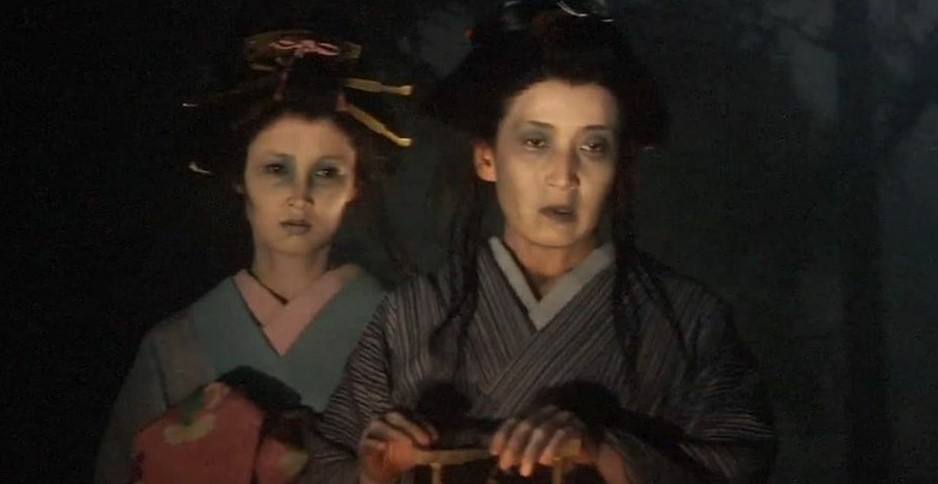
This disc includes another strong 4K restoration. A lot of the nighttime shots look surprisingly good, with little grain evident. There are also extras like a film historian track. It’s very informative and goes over background detail about the production, cast and this genre in general. The disc contains an interview with Hiroshi Takahashi (writer of Ring), who notes some of this film’s unique qualities and how the period setting allows the ghost story plot elements to seem more believable. A trailer is also included.
While the other two movies include excellent photography, The Snow Woman (1968) has a few images in it that top everything. This story begins with a sculptor and his apprentice Yosaku (Akira Ishihama), searching for the perfect piece of carving wood. They find it during the middle of a snowstorm and come face to face with the title monster (Shiho Fujimura). She lets the younger man live, but only if he never speaks of her to anyone. Years pass and Yosaku attempts to carve an important statue to prove his skills, coming up against fierce and nasty competition. The Snow Woman unexpectedly arrives in town in disguise, taking the name Yuki. She and Yosaku fall in love and even have a child together. As tension mounts for the hero to properly finish his work, will he be able to keep his word?
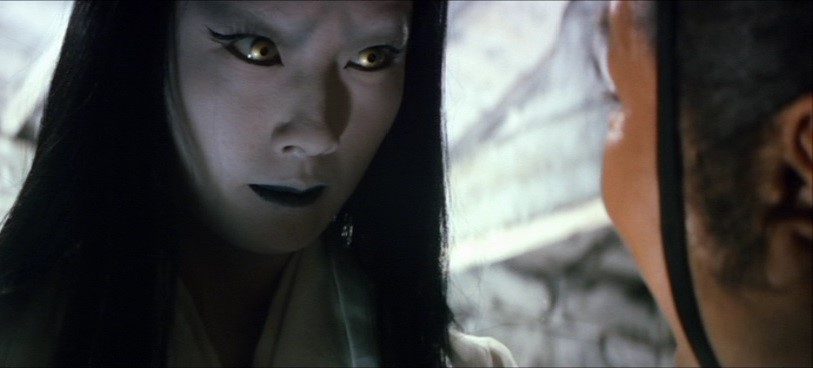
This tale is a tragedy and things do settle down in the second act (as far as supernatural events go), but it’s still a memorable picture. The opening scenes and final section are largely snowbound. They look spectacular as Yuki transforms into her pale, monster-like form, causing blizzards and going on the rampage. Buildings and people freeze before her and, even though the picture uses dissolves and obvious camera tricks to achieve the effect, it’s wonderful to witness. The uniqueness of the sudden winter vistas and the ways in which Yuki ends the lives of her targets are creatively shot and leave a distinct impression. As good as the two other pictures are, this one really stands out.
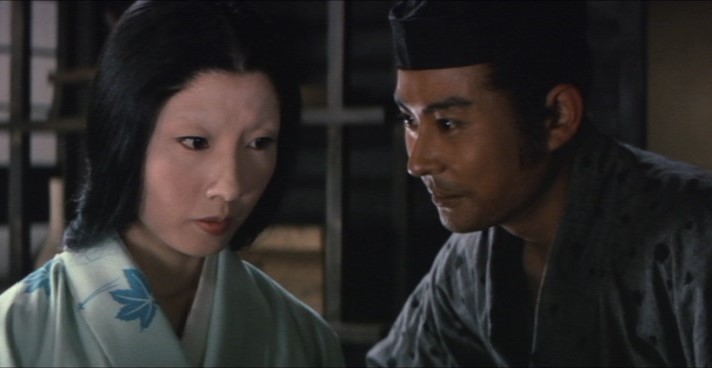
The 4K restoration on this picture looks excellent as well, particularly during the snowy sequences. This Blu-ray includes an interview with director Masayuki Ochiai (Hypnosis) talking about how atmospheric and impressive he thinks the film is. Of course, this includes the striking Yuki character, as well as the look of the feature. He notes the fact that much of the film, including the outdoor locations, were built on studio sets. The filmmaker doesn’t believe that this was a cost-cutting measure and talks about what he believes the director was trying to achieve by using sets instead. Personally, I think it was probably a combination of both factors, but few can argue that it doesn’t work.
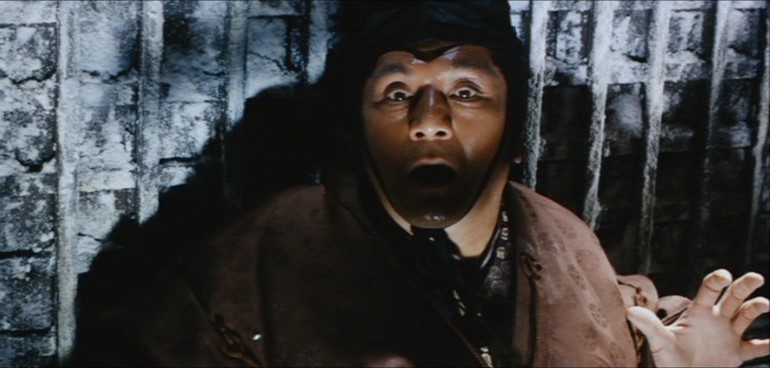
There is also a bonus visual essay about writer Lafcadio Hearn, who actually inspired many of these great tales. Curiously enough, the writer was born in Greece and lived much of his early life in Ireland, before eventually moving to Japan. He became fascinated with Japanese tales about ghosts, legends and the supernatural. Hearn translated them, resulting in the noted 1904 book Kwaidan: Stories and Studies of Strange Things. That publication was ultimately used as the basis for the 1964 classic film, Kwaidan as well as other notalbe titles. It’s a fascinating piece.
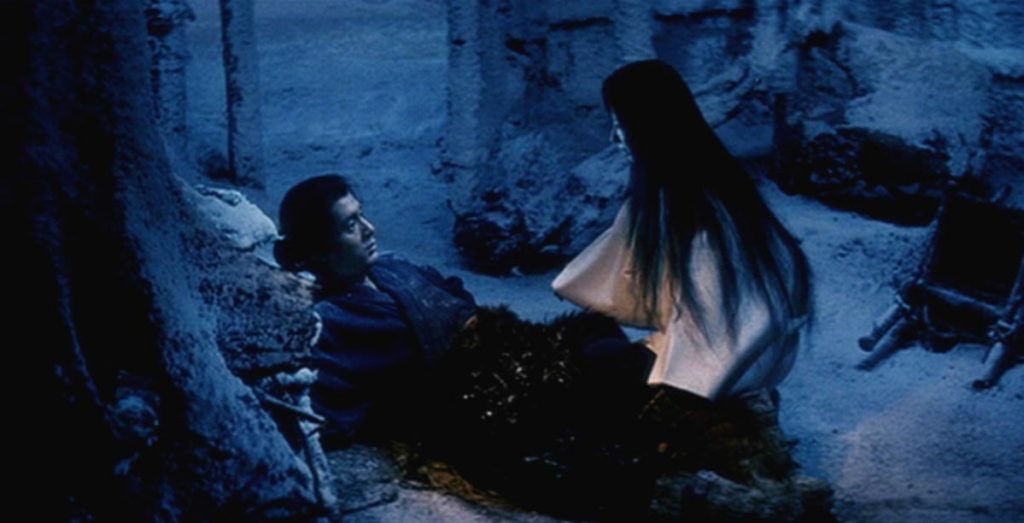
While these pictures are anything but extreme, they are fascinating examples of period ghost tales from an earlier era. Japanese ghost stories have a long history and can certainly hold their own with chillers from other countries. These films are all lavishly made, interesting and look as good as they possibly can. The extra features help fill in some details about the history of these tales and what they all mean. Daiei Gothic: Japanese Ghost Stories is another excellent Blu-ray set from Radiance Films that is well-worth checking out.


